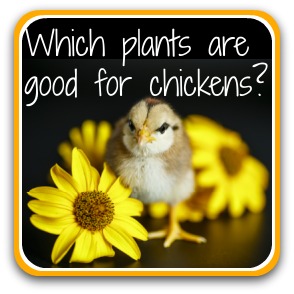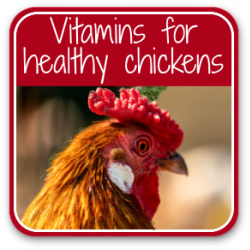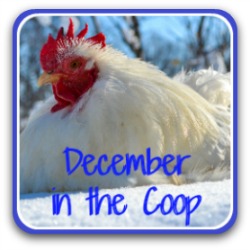- Home
- Plants for Chickens
- Herbs
Herbs for chicken health: the top ten.
As responsible chicken keepers, we're always on the watch for natural ways to improve the health of our flock.
In recent years, commercial egg production systems have joined the drive for alternatives to chemicals, in order to ensure the health and wellbeing of flocks.
This concentration on developing natural methods has resulted in excellent studies of the impact of herbs for chicken health and improved egg quality.
This article takes ten of the best and most easily grown herbs, and reviews each one based on those properly researched studies.
You will find a full list of resources at the end of this article for further reading.
It looks at the impact of each, its vitamin and mineral levels, which specific conditions it can help treat and, importantly, how each one should be fed to chickens and in what quantities to achieve the maximum possible benefit.
It's an inexpensive and fun way of making sure your chickens are getting the healthiest natural additives to their feed.
Bear in mind, though, that too much of anything is not good for your flock. Everything in moderation is key – even with natural produce.
Important note:
I am not a veterinarian, and this information does not constitute veterinary advice.
If your chickens seem unwell, or if you're at all worried about your chickens and how to treat them, you should consult your nearest avian veterinarian.
If you purchase a product through links on this page, I may receive a small commission at no extra cost to you. I only recommend products I have bought (or would buy) myself, and which I believe will genuinely benefit you. You can read my full disclosure policy here.
Looking for a particular herb?
Use these links to jump to the one you want – or carry on reading about them all.
Can chickens eat fresh basil?
Basil is one of the easiest herbs to grow, one of the healthiest for chickens, one of the best for keeping flies away from the coop, and one of the easiest to feed to your flock(1).
Basil's claim to chicken fame: known to increase antibodies to fight Newcastle disease.

General: specifically in terms of herbs for chicken health, basil has been proven(1) to...
- increase the chicken's ability to digest feed
- boost the immune system
- increase antibodies to Newcastle disease
- help with heat stress
- improve egg laying frequency.
Vitamin and mineral content:
- Excellent source of Vitamin ‘A’, required to keep respiratory system healthy.
- Good source of calcium for strong bones and eggshells (but additional calcium in the form of oystershell should also be offered).
Other uses:
- Basil is also said to help prevent flies in the chicken coop. Simply hang a bunch of fresh basil near the coop door.
How to feed basil as one of the most effective herbs for chicken health.
Summer: best fed in fresh bunches during the growing season.
Winter: pick fresh leaves and dry them in a dehydrator or oven. Crumble the dried basil over food at the rate of about 3 – 5 grammes (0.1 oz) to one kilo (2.5lb) of feed.

Will chamomile de-stress your chickens?
There's no researched evidence that chamomile will send your chickens to sleep!
It's easy to grow from seed as part of your lawn, or for faster coverage buy young plants from your local supplier.
Chamomile's chicken claim to fame: it's proven to be one of the best ways of helping eliminate Salmonella(2).

General: specifically in terms of chicken health, chamomile has been proven(2) to...
- be a natural, organic substitute for antibiotics in chicken care
- help protect against bacteria, viruses and fungi
- be effective against common poultry pathogens, including Salmonella and E.coli
- improve poultry growth and feed conversion rate.
Vitamin and mineral content:
- Chamomile contains a variety of bioactive phytochemicals, notably flavonoids, which function as antioxidants.
- It contains relatively large amounts of vitamin 'A', which keeps the respiratory system healthy and boosts the immune system.
- It also contains potassium, which helps deal with heat stress, creates stronger egg shells, and is critical to the development of baby chicks.
How to feed chamomile as one of the most effective herbs for chicken health.
The easiest way to feed this herb to your flock at any time of year is by making a chamomile tea.
Pick the flowers when they're young. Steep them in hot water for ten minutes. Strain, allow the water to cool, and offer to your flock in a shallow dish.
No time to grow chamomile yourself? Buy the organic flowers online!

Is dill a good herb for chicken health?
Not a herb you necessarily think of having as a staple in the garden, but it's easy to grow and its seeds are a bonus for your flock.
Dill's chicken claim to fame: if you have a chicken who's gone off their feed, try offering some dill seeds in amongst the grain.
Also an effective treatment against E-coli.

General: specifically in terms of chicken health, dill has been proven(3) to...
- help stimulate appetite in sick chickens
- improve gut health
- reduce cholesterol levels
- neutralise free radicals, which helps prevent or slow damage and preserve health of vital cells.
Vitamin and mineral content:
- Dill contains high levels of Vitamin ‘A’ which helps increase digestive health
- Its high levels of potassium promote healthy muscle development and heart function.
How to feed dill as one of the most effective herbs for chicken health.
Planting this herb in your chicken run is fine – the flock can peck at the feathery leaves if that's what catches their eye.
However, studies showed that using dill seeds added to everyday chicken feed was both simple and showed a more significant change in health than other parts of the plant.
Add at the rate of about one teaspoon per kilo (2.4lbs) of chicken feed.
No time to grow dill yourself? Buy the seeds online!

Can chickens have garlic?
Have you read that garlic is a member of the onion family and therefore poisonous to chickens?
Not so!
It's one of the most widely researched herbs in terms of chicken health, and proven beyond doubt to be beneficial to their wellbeing.
Garlic's chicken claim to fame: proven to be active against bacteria including Salmonellosis, Colibacillosis and Cholera(4).
And no, fed in the right amounts it won't make eggs taste of garlic!

General: the benefits of garlic are so many that I have an entire article dedicated to it. There you will find a list of everything it can help with.
In particular, if you have a chick or chicken which is generally weak and seems to be failing, take a look at the article for detailed information.
Find the article about the benefits of garlic for chickens here.
How to feed garlic as one of the best herbs for chicken health.
It's proven that crushed, fresh garlic is the most beneficial way of feeding garlic to chickens(4). Mixing it with feed can be difficult, since its moisture can promote mould, so adding it to water is the best method.
For details and measurements, see this page.

Can chickens eat mint?
Yes – but – not any mint.
Research has shown that peppermint is the most effective of the mint herbs for chicken health.
Not only easily grown but invasive unless controlled, it's worth having a pot of mint in your chicken run. Keeping its roots confined prevents it spreading everywhere!
Its chicken claim to fame: proven to increase the strength of egg shells in laying hens(5).

General: specifically in terms of herbs for chicken health, peppermint has been proven(5) to...
- increase eggshell thickness
- improve food absorption
- enhance gut health
- prevent growth of bacteria such as Salmonella, and organisms such as Pneumococal pneumonia, Mycoplasma, Staphylococcus and Streptococcus.
Vitamin and mineral content:
- Mint contains high levels of Vitamin 'A', which adds to its ability to improve digestive health.
- It also contains iron, proven necessary to sustain levels of egg production and to help in situations where loss of blood has occurred, such as a predator attack.
Please note: too much iron is toxic for chickens, so as with all herbs feed in moderation and do not go over the advised dosages.
How to feed mint for chicken health.
- Simply allow your flock to chomp on the fresh leaves. They won't take any more than they need.
- If you're not able to grow peppermint, buy dried organic peppermint leaves online.
- Feed dried leaves at the rate of 20 grammes (about 3.5 teaspoons) per kilo (2.5 lbs) of feed.

Is oregano good for chickens?
A powerful antibiotic, Oregano is now used in many commercial poultry farms as an alternative to chemicals to help guard against disease.
Oregano's chicken claim to fame: a good antidote following a predator attack.

General: specifically in terms of chicken health, oregano has been proven(6) to...
- have antioxidative, anti-inflammatory, antimicrobial, and antiviral characteristics which...
- improve the production of natural antibodies, which help boost the immune system
- contain anti-inflammatory properties in the intestines, promoting healthy digestion
- increase the absorption of vitamins and minerals in the diet.
Vitamin and mineral content:
- Contains high amounts of Carvacrol, an antioxidant and antimicrobial agent, which can help fight Listeriosis – a condition which can occur after stressful events such as a predator attack(6).
- It also contains traces of Vitamins 'A', 'C', 'E' and 'B6'. See my detailed article about the benefits of vitamins for chickens.
How to feed oregano to your flock.
- Studies found the oil of the plant to be much more effective than its leaves.
- If you grow fresh oregano, dry the leaves and add to your chickens' feed at the rate of about one tablespoon per kilo (2.5 lbs).
Oil of Oregano:
- Please note: the correct usage is Oil of Oregano, which is a herbal supplement, NOT oregano essential oil, which is not for consumption.
- Studies showed the most effective dosage is no more than half a teaspoon of Oil of Oregano per kilo (2.5lbs) of feed.
- Alternatively, add one drop per gallon of fresh water to your chickens' waterer. Do not add more than once per month.

Italian parsley vs curly parsley: which is the best of these two herbs for chicken health?
Flat-leafed parsley is scientifically proven to have a much higher concentration of essential oils in its leaves.
So if you're going to feed parsley to your flock, make sure it's the flat-leaved variety.
Parsley's claim to chicken fame: high levels of vitamin 'C', critical for supporting the immune system, particularly in cold weather. Described as an “immune enhancing multi-vitamin”(7).

General: the benefits of parsley are so many, and it's so easy to grow, that I have an entire article dedicated to it. There you will find a list of everything it can help with.
Read my article about feeding parsley for chicken health.
Vitamin and mineral content:
- Both the leaves and the stem contain a very high level of Vitamin 'C' – equivalent to four times that of a lemon.
- Iron: Particularly important for laying hens to ensure egg quality and the healthy development of chicks.
- Essential oils: contains between 2% and 8%, including linoleic, myristolic, and other fatty acids known to be important for healthy eggs, and for producing healthy chicks from laying hens.
What's the best way to feed parsley to your flock?
- Try growing it in your run from young plants in the spring, and let the chickens eat as much (or as little – chickens can be picky!) as they want.
- Dry the leaves (or buy dried parsely!) and add to chicken feed.
- Harvest parsley seeds and feed them at the rate of 3 grammes to one kilo of feed (about half a teaspoon to 2.5 lbs).
See this article for detailed information about feeding parsley to chickens.

Is rosemary good for chickens?
It grows well in sun, needs little watering once established, and is useful in human cooking as well as for chicken wellbeing.
Rosemary's claim to chicken fame: if you find your chickens develop Bumblefoot, try using rosemary to help treat and prevent it.

General: specifically in terms of chicken health, rosemary has been proven(8) to...
- have positive effects on egg production and the nutritional quality of the eggs
- antibacterial and antimicrobial properties, which protects the nervous system from tissue damage
- help liver and kidneys sustain good health
- help prevent blood clotting
- be particularly effective in the prevention of bacterial and Staphylococcus aureus infections such as Bumblefoot.
Vitamin and mineral content:
- Contains some vitamin ‘A’ (helps respiratory system), ‘B’ (sustains nerve function) and ‘C’ (prevents cell damage, boosts immune system).
- Contains large amounts of manganese, an important trace element essential for egg production. If it's missing in the chicken diet, it can mean lower production of eggs and poor quality of eggshells.
How to feed rosemary to your chickens.
- Chickens are highly unlikely to eat fresh rosemary. To add it to their diet, dry and grind the leaves, and sprinkle on their feed at the rate of one teaspoon per kilo (2.5lbs) of feed.
- Not in a sunny area where rosemary will thrive? No problem – buy dried rosemary online. Make sure it's organic, and of a high quality.

Can chickens eat sage?
Sage is used in both commercial and backyard chicken care because of its ability to counteract the impact of free radicals on cells and help prevent bacteria and mould causing disease.
Sage's claim to chicken fame: decreases the amount of damaging cholesterol levels in eggs.

General: specifically in terms of herbs for chicken health, sage has been proven(9) to...
- provide a natural alternative to antibiotics
- prevent the spread of micro-organisms
- significantly reduce the counts of bacteria in eggshells
- significantly reduce the prevalence of E. coli in the digestive system
- decrease damaging cholesterol levels and increase High Density Lipids, which may have an effect on lowering cholesterol levels in eggs.
Vitamin and mineral content:
- Particularly high in Vitamin 'K', helpful in strong bone growth and known to be helpful for older chickens.
- Vitamin 'K' is also critical to blood clotting, so may be useful following a predator attack.
- Sage has traces of, but is not particularly high in, other vitamins or minerals.
How to feed sage to your flock.
- Fresh sage tastes quite bitter, so chickens tend to avoid it.
- The studies of the impact of sage on chicken health have all used powdered sage leaves, at the rate of 1%.
- If you grow fresh sage, dry leaves either by hanging or using a dehydrator. When dried, crush into a powder.
- Mix two teaspoons of sage powder into every kilo (2.5 lbs) of feed.
- Don't grow your own? Buy some dried sage powder online and keep it in your chicken first aid kit.

Can chickens eat thyme?
One of the best sources of phytonutrients, vitamins and minerals(10).
Thyme's claim to chicken fame: lowers rates of the E.coli bacteria.

General: specifically in terms of chicken health, thyme has been proven(10) to...
- stimulate the digestive system
- improve egg production
- support and enhance the immune system, in particular lowering rates of E.coli
- increase antioxidant activity
- increase ability to utilise Vitamin ‘C’.
Vitamin and mineral content:
- High in vitamins 'A', 'C', with traces of Vitamin 'K' and the 'B' complex range.
- Its leaves are also an excellent source of potassium, calcium, iron, manganese, magnesium and selenium.
- Taken together, this is an important herb for the immune system and for the generation of healthy cells.
What's the best way to feed thyme to your flock?
- Studies found the greatest impact of thyme was found in dried leaves.
- Grow fresh thyme and dry the leaves by hanging or dehydrating, then crushing into a powder.
- Add to your chickens' feed at the rate of one teaspoon (5 grammes) of thyme to each kilo (2.5 lbs) of feed.
- Not able to grow thyme yourself? No problem buy online and keep as part of your stock of chicken health benefits.

Related pages about the natural treatment of chickens which you may find useful.

Sources.
All this information is taken from reliable, scientific, peer-reviewed research. These are a few of the resources I’ve used for this list, in alphabetical order by herb.
1. Basil: Jahejo, A. R, et al: Immunomodulatory and Growth Promoting Effects of Basil (Ocimum basilicum) and Ascorbic Acid in Heat Stressed Broiler Chickens. Pub. Journal of Zoology, 2019.
2. Chamomile: Abd El Hack et al: Chamomile: functional properties and impacts on poultry/small ruminant health and production – A Review. Pub. Annals of Animal Science, 2023.
3. Dill: Rahimian, Y et al: Effect of using different levels of Dill seeds on performance, some blood biochemical and intestinal microbial population in broiler chicks. Pub. Journal of Herbal Drugs, 2017.
Magnesium requirements: Shastak, Y et al: A review of the role of magnesium in poultry nutrition. Pub. Journal of Poultry Science, 2015.
4. Garlic: Olobatoke, R., and Mulugeta, S.: Effect of dietary garlic powder on layer performance, fecal bacterial load and egg quality. Pub. Poultry Science, 2011.
Rehman, Z., and Munir, M: Effect of garlic on the health and performance of broilers. Pub. Veterinaria, 2015.
5. Mint: Abdel-Wareth, A., and Lohakare, J.: Effect of dietary supplementation of peppermint on performance, egg quality, and serum metabolic profile of Hy-Line Brown hens during the late laying period. Pub. Journal of Animal Feed, Science and Technology, 2014.
Asadi, N., et al: Performance of Broilers Supplemented With Peppermint (Mentha piperita L.) Powder. (Journal of Evidence Based Complementary and Alternative Medicine, 2017).
6. Oregano: Migliorini, Marcos J et al. "Oregano essential oil (Origanum vulgare) to feed laying hens and its effects on animal health." Pub. Anais da Academia Brasileira de Ciencias, 2019.
Ruen et al: Effects of dietary oregano essential oil supplementation on growth performance, intestinal antioxidative capacity, immunity, and intestinal microbiota in yellow-feathered chickens. Pub. Journal of Animal Science, 2021.
El-Gazzar, M: Listeriosis in Poultry. Pub. MSD Veterinary Manual, 2024.
7. Parsley: Nihad, D: Effect of Additional Different Level of Parsley Leaves (petroselinum sativum) Powder to the Ration on Some Blood Serum Biochemical Traits of Broiler Chickens. Pub. Journal of Natural Sciences Research, 2016.
Al-Dharaji, H, et al: The Influence of Parsley (Petroselinum crispum) as Feed Additive on Hematological Traits of Local Iraqi Geese. Pub. Advances in Nutrition Research, 2012.
8. Rosemary: Ghanima, A, et al: Effect of housing system and rosemary and cinnamon on layers’ performance, egg quality, haematological traits, blood chemistry, immunity and antioxidant. Pub. Animals Journal, 2020.
9. Sage: Rasouli, B, et al: Effect of sage (Salvia officinalis L.) aqueous leaf extract on performance, blood constituents, immunity response and ileal microflora of broiler chickens. Pub. Agroforestry Systems, 2020.
Galamatis, D., et al: Effects of Dietary Supplementation of Salvia officinalis L. in Organic Laying Hens on Egg Quality, Yolk Oxidative Stability and Eggshell Microbiological Counts. Pub. Animals: an Open Access Journal, 2021.
10. Thyme: Bolukbasi, S. C.: Effect of dietary thyme on laying hens’ performance and e.coli concentration in feces. Pub. International Journal of Natural and engineering Sciences, 2006.
Halat, D., et al: A Focused Insight into Thyme: Biological, Chemical, and Therapeutic Properties of an Indigenous Mediterranean Herb. Pub. Nutrients, 2022.
11. Vitamin Requirements: Poultry DVM.
12. General: Bloom, Jessi: Free Range Chicken Gardens. Pub. Timber Press.
- Home
- Plants for Chickens
- Herbs














